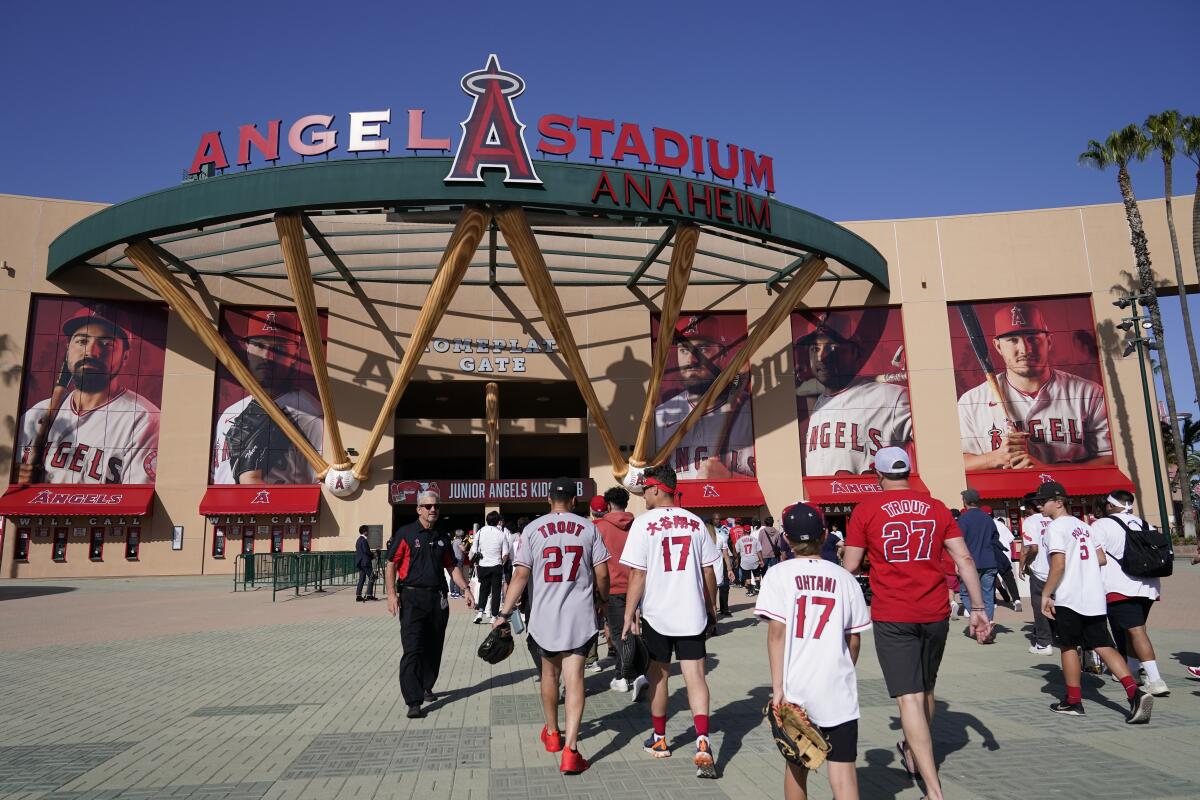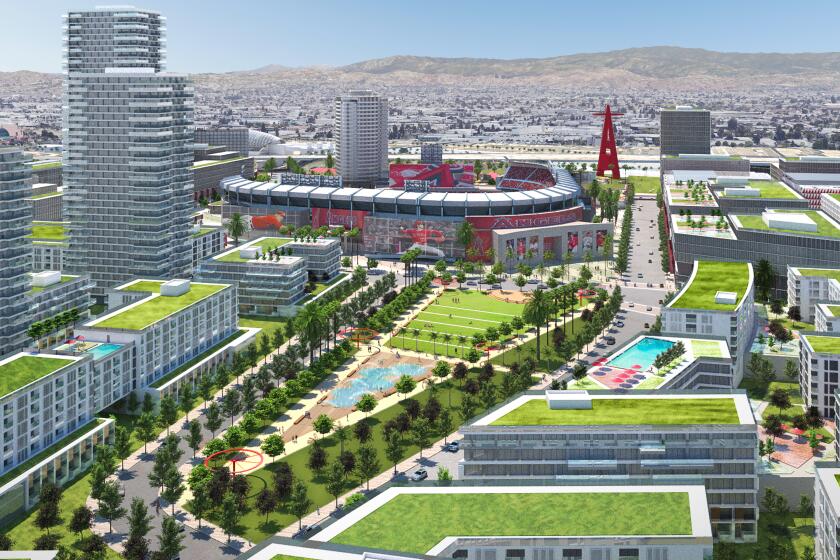Commentary: Keeping baseball in Anaheim has its price

- Share via
In Oakland, where the city is considering a ballpark village for the Athletics, a City Council member proposed a popular vote on the project. Let the people decide!
The mayor has politely rejected the idea. The people decide on their representatives, who then study complex issues of civic financing and land use before casting their vote.
“It seems unreasonable to expect residents in their own free time to have the ability to do the type of due diligence to make an informed vote,” Oakland Mayor Libby Schaaf told the Oaklandside.
It naturally follows that, if the people do not like the outcome, they can vote out their representatives. That brings us to Anaheim, where the City Council on Tuesday ratified what should be one of the final approvals in the Angels’ quest for their own ballpark village.
In this long and winding saga — so long that Josh Hamilton manned the Angels’ outfield when it started — there have been no popular votes.
Harry Sidhu, the Anaheim mayor, campaigned on a promise to get a deal done with the Angels. He has fulfilled that promise, an accomplishment he can trumpet as he runs for reelection this year.
Sidhu did himself no favors during Tuesday’s council meeting. In order to settle what the state housing agency found to be a violation of affordable housing law, the city has agreed to pay $96 million toward construction of affordable housing beyond the Angel Stadium property.
The Anaheim City Council is expected to ratify the agreement on the Angel Stadium land sale Tuesday. The city and state plan to submit it for approval.
Sidhu called that amount “new cash” paid to the city by Angels owner Arte Moreno and his development company.
Rob Fabela, the city attorney, had to explain that the $320-million land sale to Moreno’s company had called for $124 million in affordable housing credits — essentially, a rebate so Moreno would include affordable housing in his ballpark village. Now, Fabela said, the city would split that $124 million: $96 million to the affordable housing fund and the other $28 million remaining with Moreno’s company.
To the extent that this is “new cash,” this is how it works: The city gave Moreno $124 million in credits and said Moreno gave back $96 million in cash so the city could satisfy the settlement without tapping into its general fund. That freed Moreno from his commitment to build 466 units of affordable housing, without even a penny of new net cash to the general fund.
And, while the settlement with the state promised close to 1,500 units of affordable housing on and off the Angel Stadium property, city staffers explained that promise cannot be fulfilled until the commitment with Moreno’s company is renegotiated and additional funding — from the state, the federal government or somewhere — is secured.
The prospect that most of that housing would be segregated away from the stadium site concerned two council members, which brought a sharp retort from another council member.
“We had affordable housing on the site before [the state housing agency] got involved,” Councilman Trevor O’Neil said.
Ultimately, whether Anaheim voters like this deal might depend on this laudable big picture: Moreno’s company renovates or replaces the stadium and develops the surrounding land at its expense; the city gets housing it desperately needs, plus tax revenue from a site it has failed to develop for half a century.
Mike Trout donned a cowboy hat after his home run in the Angels’ 4-1 win over the Cleveland Guardians. Manager Joe Maddon thought of Gene Autry.
To get that deal, it required the city to leave money on the table, since the land is worth more without a stadium eating up some of the property. Based on the city-commissioned appraisal, the land without baseball was worth $500 million, so the city left $180 million on the table.
That is the price for keeping baseball, which even the council members opposed to the deal insisted they wanted to do. The credits and funds for housing and parkland — additional subsidies for city priorities — left the city with $150 million in cash from the sale. Over three decades, the city says, the new tax revenue could more than quadruple that amount.
But appraisal is just a fancy word for estimate, and the city never put the land up for bid, even after the state housing agency said doing so could have resolved the violation.
On a video conference to announce the settlement Monday, I asked Sidhu why the city had declined to put the land up for bid. He thanked me for the question but stopped short of an explanation.
“Our process was very fair and very straightforward,” Sidhu said. “We believed in our process.”
On Tuesday, a different voice emerged.
“It was a corrupt, no-bid deal,” Ashleigh Aitken said.
Aitken is running against Sidhu for mayor. To say the deal includes $96 million in new cash, she said, is to engage in a “shell game.”
Angels manager Joe Maddon moved Shohei Ohtani from leadoff to the No. 2 spot for the team’s 3-0 win over the Cleveland Guardians on Monday.
In Anaheim, officials have wondered when Aitken might speak up. The Angel Stadium deal is just about done, and her campaign website makes no mention of it.
“Everybody runs their campaign differently,” she said. “I try to not run my campaign only via Facebook rants. That’s just not what I do, and I don’t find it effective.”
It might be too late. Sidhu has the power of incumbency and, now, the Angels deal he pledged to secure. By the time the November election arrives, the details of the Angel Stadium saga might well be forgotten.
Said Sidhu: “We know that the vast majority of the community supports our plan.”
Said Aitken: “I have not heard anyone outside of the council and the Chamber of Commerce — what I like to call the Echo Chamber — that is positive about this deal.”
The fate of a sports team can be overrated in a campaign, and can overshadow what matters most to residents in their day-to-day life. In Oakland, the Raiders and Warriors left town, and Schaaf was reelected. In Anaheim, the Angels have extended their stay through 2050.
The November election is the popular vote on the Angel Stadium deal. If the Angels somehow play deep into October, Sidhu wins in a landslide.
More to Read
Go beyond the scoreboard
Get the latest on L.A.'s teams in the daily Sports Report newsletter.
You may occasionally receive promotional content from the Los Angeles Times.










